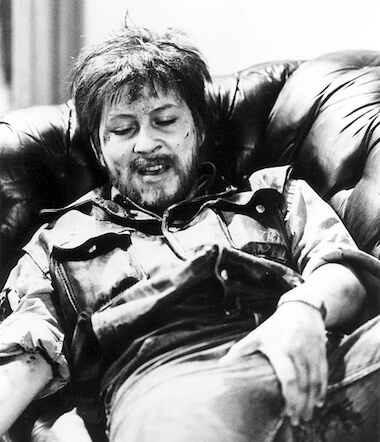Wang Bing offers little in the way of positive signs about human nature in “‘Til Madness Do Us Part.” | ICARUS FILMS
Watching Chinese director Wang Bing’s documentary “‘Til Madness Do Us Part,” you have to keep reminding yourself that it’s set in a mental hospital, not a prison. A modern-day example of direct cinema, Wang’s film plunges the spectator into the disorienting world of a hospital for patients who’ve been committed against their will.
No one who writes about it fails to mention Frederick Wiseman’s “Titicut Follies,” a documentary about a Massachusetts mental hospital guilty of abusing its patients, but Wang’s aesthetic is a product of the video age. In fact, “‘Til Madness Do Us Part” evokes a wide range of American films and TV shows set in prisons. It may not depict the rapes and murders shown on HBO’s “Oz,” but the spiritual deadness is familiar. Even though therapy is the hospital’s supposed goal, boredom and overmedication seem to be its main methods: punishment by other means.
“‘Til Madness Do Us Part” isn’t exactly entertaining, but it’s one of the most powerful films I’ve seen in 2016.
Wang Bing takes viewers inside a Chinese mental hospital
For a long stretch, Anthology Film Archives was the only New York venue interested in showing Wang’s work. It gave theatrical runs to his previous documentaries “West of the Tracks” and “Three Sisters” (which has also been acquired by Icarus Films and will play the Williamsburg micro-theater Spectacle in early June.) While it might seem uncommercial, especially given its four-hour running time, “‘Til Madness Do Us Part” is the first Wang film to attract an American distributor, albeit three years after it was made. Perhaps it’s drawing more attention because it seems to reflect our own problems with over-incarceration.
The film offers no explicit context until a closing title crawl informs us that the patients are a mixture of people who’ve been committed by their families, political prisoners, substance abusers, the developmentally disabled, violent criminals, and people who just can’t fit into Chinese life. It seems as though the Chinese mental hospital style combines the Russian communist practice of confining the politically unruly to hospitals with the American tendency to jail mentally ill people for petty crimes rather than giving them the kind of treatment that could prevent them from committing crime in the first place.
Wang seems to have shot his film on a cheap, consumer-grade video camera. (He’s credited as a co-cinematographer, along with Liu Xianhui.) At night, the image is full of grain, bordering on pixelation. A great deal of “‘Til Madness Do Us Part” was shot under dim nocturnal lighting. In a few scenes, the camera lens seems to have gotten dirty, but no one bothered to wipe it off. Wang is obviously more concerned with intensity than beauty. He uses several very long takes to let difficult situations build.
At first, our sympathies are likely to lie entirely with the patients. They seem to have nothing to do but sleep and watch TV. If they ever get to see a psychiatrist, we don’t witness it. They don’t even seem to get access to books. This degradation leads them to treat their surroundings like crap — while there’s a urinal on the tier where they live, we frequently witness men urinating into chamber pots or even letting their bladders loose on the floor.
One man acts like he’s just mainlined a mix of heroin and Thorazine after getting a mysterious series of injections. When a man does 20 laps around the tier, he seems to be one of the few patients with the energy for such an endeavor. And he’s also one of the few to call out the otherwise silent Wang.
A visit between a man and his wife shows the other side of hospital life. He’s rude to her, but that’s just the beginning. When she plays a song she downloaded for him on her iPhone, he keeps shouting, “Turn it off!” He goes so far as slapping her. It’s easy to understand why she would rely on the state’s power to get this man out of her life, even if she also has obvious affection for him.
Some of the men in “‘Til Madness Do Us Part” have been institutionalized for decades. It’s not clear if medication has eaten away at their sex drives or if any situational homosexuality takes place. However, there are a couple of patients who like to sleep and cuddle together, and “‘Til Madness Do Us Part” ends on the image of them holding hands. I’m not sure how erotic their relationship is, but their affection — platonic or not — is one of the few positive signs about human nature you’ll find in this film. Resistance can be found in a place even as oppressive as this hospital.
‘TIL MADNESS DO US PART | Directed by Wang Bing | Icarus Films | In Yunnan with English subtitles | Opens Jun. 9 | Anthology Film Archives, 32 Second Ave. at Second St. | anthologyfilmarchives.org





































